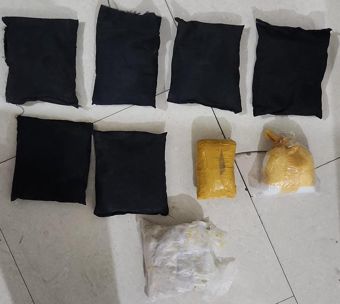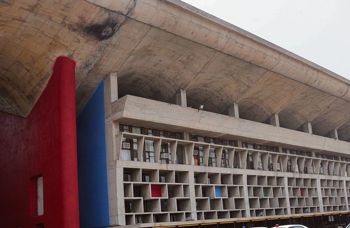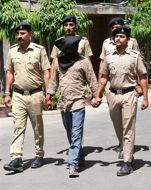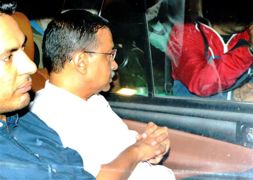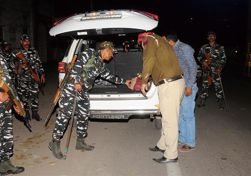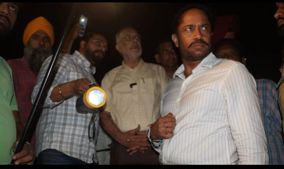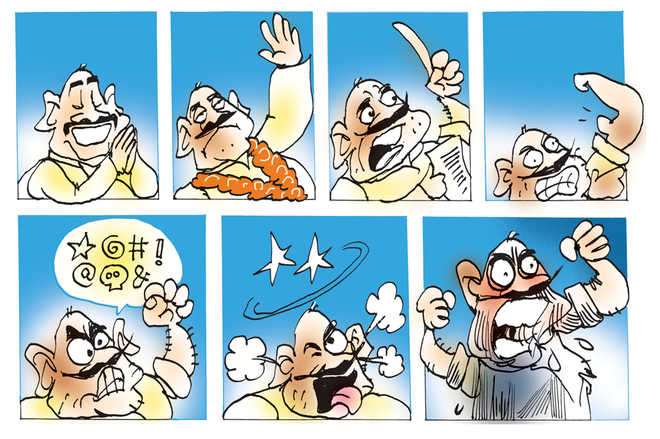
Illustration: Sandeep Joshi
Harish Khare
I think it is time we recognised that this arrangement of staggered polling has degenerated into an absurdity. The seven-week long polling exercise in Uttar Pradesh not only seems interminable but is also beginning to take a disproportionate toll on our collective sanity.
Staggered over seven phases, the exercise seems to have lost its sanctity and has got reduced to an unending spell of name-calling, inducing the politicians to cheapen themselves further after each phase.
This staggering has consequences for other states. Punjab has been without a popular government for more than a month because the votes for the Punjab Assembly would not get counted till the UP exercise is done with. Uttarakhand, too, is without a government.
It began as a much-needed assertion and control by the Election Commission, during the TN Seshan era, over the electioneering processes. The ECI earned worldwide recognition and respect for maintaining its institutional autonomy and ensuring that violence, money, fraud and intimidation are minimised and that no ruling party gets any undue advantage. All this is fine and needs to be much appreciated.
But now it is obvious that the staggering of elections has become a ritual. We need to take a balanced view. Elections remain as expensive as ever. And because political parties would not submit themselves to any control in matters of funding, the elections remain the cause for much of black money, with or without demonetisation.
The argument for staggering a poll schedule is that it enables the commission to ensure deployment of security forces. On the other hand, the fact is that only less than 2 per cent of polling booths are deemed to be “sensitive.”
The unstated assumption is that we are teeming with large armies and bands of criminals who will overwhelm a smaller number of security personnel. This is an exaggeration. More than the numbers, what is needed is a definite perception that the security forces would be firm and fair.
The prolonged, staggered format has been gamed. All stakeholders and busybodies — the local newspapers, national and regional television channels, financers, cadres, gunrunners, liquor barons, criminals, bent policemen, biased officials — regroup themselves after each phase to contaminate the election process.
In the current contest, the Prime Minister has allowed himself to get involved extensively in a state election. And, as officials tell, since all decision-making has got concentrated in one person, no decisions are being made till the Prime Minister frees himself from the time-consuming electioneering. There is a certain banality to the rites of seeking votes. National energy and attention are getting sucked into petty pursuits. As a nation, we all have been made to feel and act small.
THE Union Territory administration has talked of a green tax on commercial vehicles entering Chandigarh. About time. A basic principle should be invoked: the polluter has to pay.
If Chandigarh has to retain its high quality of life, it is very much necessary that all possible preventive ideas and steps be introduced to minimise degradation of its environment, its air and its water. Resources have to be found and its citizens should be prepared to fork out taxes to enable the authorities. This is the price citizens in great cities all over the world pay.
Environmental concerns should be of interest to all across the spectrum. Pollution adversely affects the rich and the poor alike. And, everyone ends up paying a much higher price if the city’s air or water gets contaminated.
As it is, I have noticed a marked deterioration in the civic services in the last one-and-a-half years. The parks are being poorly maintained; the garbage collection, street-sweeping are indifferently attended to. The traffic is getting chaotic by the day.
Harsh measures and stiff fines are inevitable if Chandigarh needs to retain its City Beautiful tag. Citizens need to be educated and involved in protecting the city’s environment.
THERE are not that many political leaders who have the skill or the craft — and, the intellectual courage — to write a newspaper column. Nor do we have much of a tradition of ministers and political leaders churning out their memoirs. Belting out a column makes a demand on the author which is different from writing a full-length book of memoirs.
Reminiscences and memoirs tend to inject post-facto rationalisation, even reflect changed loyalties. The weekly format, on the other hand, forces the columnist to show his hand, intellectual biases and political affiliations.
It is usually out-of-office politicians who dabble in the art of column-writing, which demands both discipline and diligence. I think Mani Shankar Aiyar and K Natwar Singh were perhaps the first to establish the sect; then, P Chidambaram followed; and, later Manish Tewari joined the band. All three of them happen to be Congressmen and stand out as odd men out. The Congress party does not encourage much familiarity with the world of ideas and ideologies; it encourages conformism and abets sycophancy. Manish goes against this grain.
He has put together his newspaper pieces in a book titled Decoding a Decade — The Politics of Policy-making. It is to be “launched” in Chandigarh on Monday at a function in Panjab University. Manish has done me the honour of asking me to be “in conversation with the author.”
Manish’s pieces command attention and respect. Intelligence, political socialisation and education, and experience inform these writings. He does not write like a pamphleteer; instead, there is a hint of a policy wonk at work. In all too brief an introduction, he dares to make the claim that the much-maligned political class has not done all that badly by the nation or by the citizens — the republic has been sustained; the rites of peaceful transfer of power firmly established; there is reasonable assurance of a fair and level playing field for electoral contestations; and, a constitutional architecture that ensures a kind of institutional equilibrium stands consecrated.
I think the sharper pieces in this collection are those written after May 2014; not because these are — as could be expected — sharply critical of the Modi sarkar but because these are reflections by a more seasoned and a more experienced mind.
Take for example his thoughtful piece, The geopolitics of Pathankot, written a few weeks after the terrorist attack at the Pathankot Air Force base. He gently chides the new government that “diplomacy on the hop is not a great idea.”
And, he makes a case that the Modi government had been played for a song. He points out: “The myth of differences between the civilian government and the military establishment in Pakistan is a ‘good cop, bad cop’ act” that Pakistan has perfected to play the international community along and blindside India.
Partisanship in domestic politics does not behove a nation that aspires to a global stature. Manish points out that it was the Vajpayee government that had initiated “the Next Step in the Strategic Partnership,” the blueprint for a closer relationship between New Delhi and Washington; and, then, Manish reminds us that “the moment BJP was out of government, it started opposing every aspect of the Indo-US engagement with a vengeance.”
This collection, Decoding a Decade, makes an easy reading and offers a clue as to the deepening bitterness in our national affairs.
I am very much touched to have received two cheques, for Rs 500 each, from Mr VK Kapoor from Abohar in Fazilka district. The money is meant for Mrs Neelu Sarin and Mr UK Sharda, the two good Samaritans who were mentioned in Kaffeeklatsch two weeks ago.
In the covering note, handwritten on the back of a flyer, Mr Kapoor, who is 69 years old, says he is sending the money “out of my meagre pension.” This is a very heartwarming example of civic consciousness.
Do join me in raising a cup of coffee to salute Mr Kapoor.





















